
Publications and Recordings |
|
 |
Singing God's Words: The Performance of Biblical Chant in Contemporary JudaismBy Jeffrey A. Summit (Oxford University Press) 2016Singing God's Words is the first in-depth study of the experience and meaning of chanting or "reading" Torah among contemporary American Jews. This experience has been transformed dramatically in recent years by the impact of digital technology, feminism, the empowerment of lay people and a search for self-fulfillment through involvement with community. At a time when worshippers seek deeper spiritual experience, many Jews have found new meaning in the experience of reading Torah, an act that is broadly accessible to Jewish adults even as it requires intensive immersion with the text of the Bible in Hebrew. This book examines why and how growing numbers of American Jews in all denominations see the public chanting of Biblical texts during the synagogue service as one of the most authentic and personal expressions of their religious identity. Drawing on hundreds of interviews with men and women, both professionals and congregants, Jeffrey A. Summit describes how the reading of Torah embodies their understanding of historical religious practice, even as it is shaped by contemporary views of spiritual experience. Through this act, holiness becomes manifest at the intersection of Biblical chant, sacred text, the individual, and the community. BUY NOW |
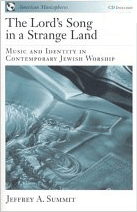 |
The Lord’s Song In a Strange Land: Music and Identity in Contemporary Jewish WorshipBy Jeffrey A. Summit
|
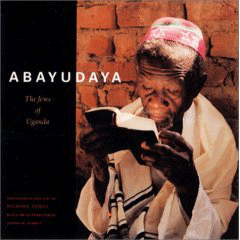 |
Abayudaya: The Jews Of UgandaBy Richard Sobol and Jeffrey A. Summit, Abbeville Press, August 2002The 1000 members of the Abayudaya community living in a remote area of eastern Uganda lead a life devoted to traditional Jewish practices. They observe the Sabbath and holidays, attend services, follow dietary laws, and cling tightly to traditions in their small mud and brick synagogues. Surrounded by Muslims and Christians, facing poverty and isolation, these people have maintained their Jewish way of life for four generations since the initial conversion of their leader Semei Kukungulu in 1917. Even during Idi Amin's reign of terror, when synagogues were closed and prayers had to be held in secret, the Abayudaya did not abandon their beliefs. Richard Sobol is the first photojournalist to document this Jewish community's way of life and to relate their heroic story. His sensitive portraits and moving landscapes depict everyday life as well as their religious celebrations and rituals. His intriguing text chronicles the story of this community from its conception to the present. The book includes an annotated CD filled with powerful music and songs recorded by ethnomusicologist Jeffrey A. Summit, who has also provided an essay examining this unique mix of African and Jewish sounds. Buy Now |
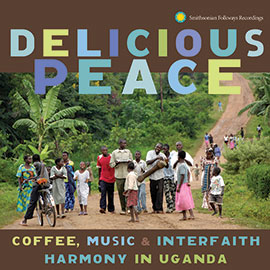 |
Delicious Peace: Coffee, Music and Interfaith Harmony in UgandaSmithsonian Folkways RecordingsThe songs in this collection are written and performed by the coffee farmers of the Peace Kawomera (Delicious Peace) Fair Trade cooperative in Mbale, Uganda. Jewish, Christian, and Muslim farmers work together to overcome generations of conflict and poverty. Village guitar groups and women’s choirs sing to stress the transformative impact of Fair Trade prices and to encourage their neighbors to join the coffee cooperative. Accompanied with xylophone, drums, and other traditional instruments, these farmers sing of the benefits of interfaith cooperation and, through music, teach new cooperative members how to produce great coffee. J. J. Keki, the founder of the cooperative, says: “Use whatever you have to create peace! If you have music, use your music to create peace. For us, we have coffee. We are using coffee to bring peace to the world.” For more information, video, photographs and liner notes search: Smithsonian Folkways Recordings, Delicious Peace or follow the links below: Buy Now Hear the NPR Interview |
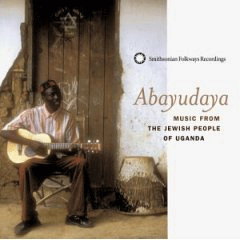 |
Abayudaya: Music From the Jewish People of UgandaVarious Artists, Smithsonian Folkways Recordings, October 2003Abayudaya: The Music of the Jews of Uganda presents a unique collection of African-Jewish music in which the rhythms and harmonies of Africa blend with Jewish celebration and traditional Hebrew prayer. This compelling repertoire is rooted in local Ugandan music and infused with rich choral singing, Afro-pop, and traditional drumming. The repertoire includes lullabies, political and children's song, religious rituals, hymns, and celebratory music, with song texts in Hebrew, English, and several Ugandan languages. This singular community of African people living committed Jewish lives has survived persecution and isolation and asserts, "We have been saved by our music." 24 tracks, comprehensive notes, lyrics, and translations. Recorded, compiled and annotated by Jeffrey A. Summit. Media Appearances: “Here and Now” on WBUR radio on Boston National Public Radio, “The Tavis Smiley Show” on National Public Radio, or Hillel International article about GRAMMY nomination. Nominated for a GRAMMY Award. |
Selected Essays & Articles |
|
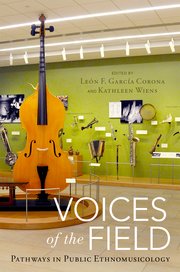 |
"Knowing How to Tell a Story"In Voices in the Field: Pathways in Public Ethnomusicology. Edited by Leon Felipe Garcia Corona and Kathleen Wiens. Oxford University Press. 2021 Ethnomusicologists face complex and challenging professional landscapes for which graduate studies in the field do not fully prepare them. The essays in Voices of the Field provide a reflection on the challenges, opportunities, and often overlooked importance of public ethnomusicology. These essays capture years of experience of fourteen scholars who have simultaneously navigated the worlds within and outside of academia, sharing valuable lessons often missing in ethnomusicological training. |
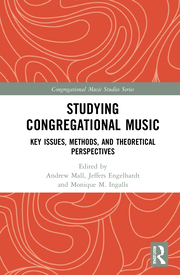 |
"Searching for a Metaphor: What is the Role of the Shaliach/Shalichat Tzibur (Leader of Prayer)?"In Studying Congregational Music: Key Issues, Methods, and Theoretical Perspectives edited by Andrew Mall, Jeffers Engelhardt and Monique Ingalls. Routledge. 2021 Studying the role of music within religious congregations has become an increasingly complex exercise. The significant variations in musical style and content between different congregations require an interdisciplinary methodology that enables an accurate analysis, while also allowing for nuance in interpretation. This book is the first to help scholars think through the complexities of interdisciplinary research on congregational music-making by critically examining the theories and methods used by leading scholars in the field. |
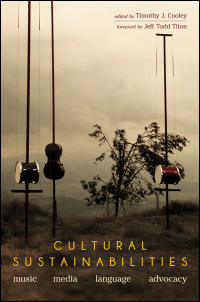 |
Cultural Sustainabilities: Music, Media, Language, Advocacy“Digital Technology, Chanting Torah, and the Sustainability of Tradition” in Cultural Sustainabilities: Music, Media, Language, Advocacy edited with an Introduction by Timothy J. Cooley. Foreword by Jeff Todd Titon. University of Illinois Press. 2019 A daring interdisciplinary journey into the nexus of the humanities and ecological science Environmental sustainability and human cultural sustainability are inextricably linked. Reversing damaging human impact on the global environment is ultimately a cultural question, and as with politics, the answers are often profoundly local. Timothy J. Cooley presents twenty-three essays by musicologists and ethnomusicologists, anthropologists, folklorists, ethnographers, documentary filmmakers, musicians, artists, and activists, each asking a particular question or presenting a specific local case study about cultural and environmental sustainability. Contributing to the environmental humanities, the authors embrace and even celebrate human engagement with ecosystems, though with a profound sense of collective responsibility created by the emergence of the Anthropocene. |
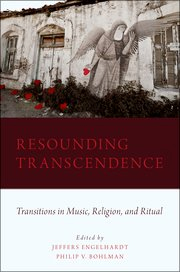 |
"Technology and the Transmission of Oral Tradition in the Contemporary Jewish Community" in Resounding Transcendence: Transitions in Music, Religion, and RitualEdited by Philip Bohlman and Jeffers Engelhardt, Oxford University Press, 2016Resounding Transcendence is a pathbreaking set of ethnographic and historical essays by leading scholars exploring the ways sacred music effects cultural, political, and religious transitions in the contemporary world. With chapters covering Christian, Muslim, Jewish, and Buddhist practices in East and Southeast Asia, the Indian subcontinent, North America, the Caribbean, North Africa, and Europe, the volume establishes the theoretical and methodological foundations for music scholarship to engage in current debates about modern religion and secular epistemologies. It also transforms those debates through sophisticated, nuanced treatments of sound and music—ubiquitous elements of ritual and religion often glossed over in other disciplines. Resounding Transcendence confronts the relationship of sound, divinity, and religious practice in diverse post-secular contexts. By examining the immanence of transcendence in specific social and historical contexts and rethinking the reified nature of "religion" and "world religions," these authors examine the dynamics of difference and transition within and between sacred musical practices. The work in this volume transitions between traditional spaces of sacred musical practice and emerging public spaces for popular religious performance; between the transformative experience of ritual and the sacred musical affordances of media technologies; between the charisma of individual performers and the power of the marketplace; and between the making of authenticity and hybridity in religious repertoires and practices. Broad in scope, rich in ethnographic and historical detail, and theoretically ambitious, Resounding Transcendence is an essential contribution to the study of music and religion. BUY NOW |
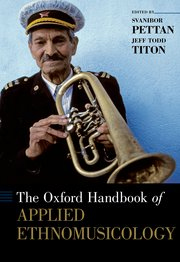
|
"Advocacy and the Ethnomusicologist: Assessing Capacity, Setting Limits and Making Sustainable Contributions," in The Oxford Handbook of Applied EthnomusicologyEdited by Jeff Todd Titon and Svanibor Pettan, Oxford University Press, 2015Applied studies scholarship has triggered a not-so-quiet revolution in the discipline of ethnomusicology. The current generation of applied ethnomusicologists has moved toward participatory action research, involving themselves in musical communities and working directly on their behalf. The essays in The Oxford Handbook of Applied Ethnomusicology, edited by Svanibor Pettan and Jeff Todd Titon, theorize applied ethnomusicology, offer histories, and detail practical examples with the goal of stimulating further development in the field. The essays in the book, all newly commissioned for the volume, reflect scholarship and data gleaned from eleven countries by over twenty contributors. Themes and locations of the research discussed encompass all world continents. The authors present case studies encompassing multiple places; other that discuss circumstances within a geopolitical unit, either near or far. Many of the authors consider marginalized peoples and communities; others argue for participatory action research. All are united in their interest in overarching themes such as conflict, education, archives, and the status of indigenous peoples and immigrants. A volume that at once defines its field, advances it, and even acts as a large-scale applied ethnomusicology project in the way it connects ideas and methodology, The Oxford Handbook of Applied Ethnomusicology is a seminal contribution to the study of ethnomusicology, theoretical and applied. BUY NOW |
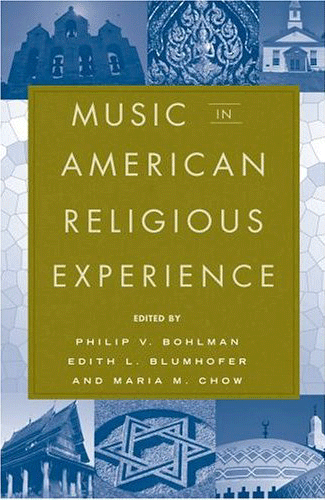
|
"Nusah and Identity: The Contemporary Meaning of Traditional Jewish Prayer Modes" in Music and American Religious ExperienceEdited by Philip V. Bohlman, Maria Chow, and Edith Blumhofer, Oxford University Press, 2005For students and scholars in American music and religious studies, as well as for church musicians, this book is the first to study the ways in which music shapes the distinctive presence of religion in the United States. The sixteen essayists contributing to this book address the fullness of music's presence in American religion and religious history. Sacred music is considered in the broadest aesthetic sense, stretching from more traditional studies of hymnody and worship to new forms of musical expression, such as ritual in nonsectarian religious movements. Musical experience intersects with religious experience, posing challenging questions about the ways in which Americans, historical communities and new immigrants, and racial and ethnic groups, construct their sense of self. This book features an interdisciplinary approach that includes scholars in both musical and religious studies; a broad range of methodologies; historical breadth extending beyond denominational and church studies, and beyond Judeo-Christian traditions; and a comparative study of traditional religious communities and of emerging groups representing multiethnic America. |
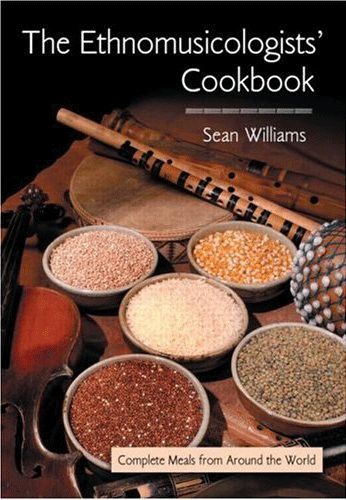
|
“If You Prolong Your Stay at Table, You Prolong Your Life: Jewish Music and Food” in The Ethnomusicologist’s CookbookEdited by Sean Williams, Routledge Press, 2006The Ethnomusicologists' Cookbook takes you around the world on a culinary journey that is also a cultural and social odyssey. |
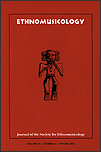
|
"I'm a Yankee Doodle Dandy?" Identity and Melody at an American Simhat Torah Celebration"Ethnomusicology 37/1, 1993Ethnomusicology is the official organ of the Society for Ethnomusicology and contains scholarly articles on the wide variety of cultural study areas, theoretical questions and interdisciplinary approaches that are characteristic of the field of ethnomusicology. The journal also includes book, recording, film, and video reviews. Peer-reviewed by the international membership of the society, Ethnomusicology has been published three times a year since it emerged from the fledgling society's newsletter first published in 1953. READ ARTICLE |

|
“Music and the Construction of Identity among the Abayudaya (Jewish people) of Uganda"In The Garland Handbook of African Music, second edition. Edited by Ruth M. Stone, Routledge Publishing, 2008The Garland Handbook of African Music is comprised of essays from The Garland Encyclopedia of World Music: Volume 1, Africa (1997). Revised and updated, the essays offer detailed, regional studies of the different musical cultures of Africa and examine the ways in which music helps to define the identity of this particular area. |
Recordings |
|
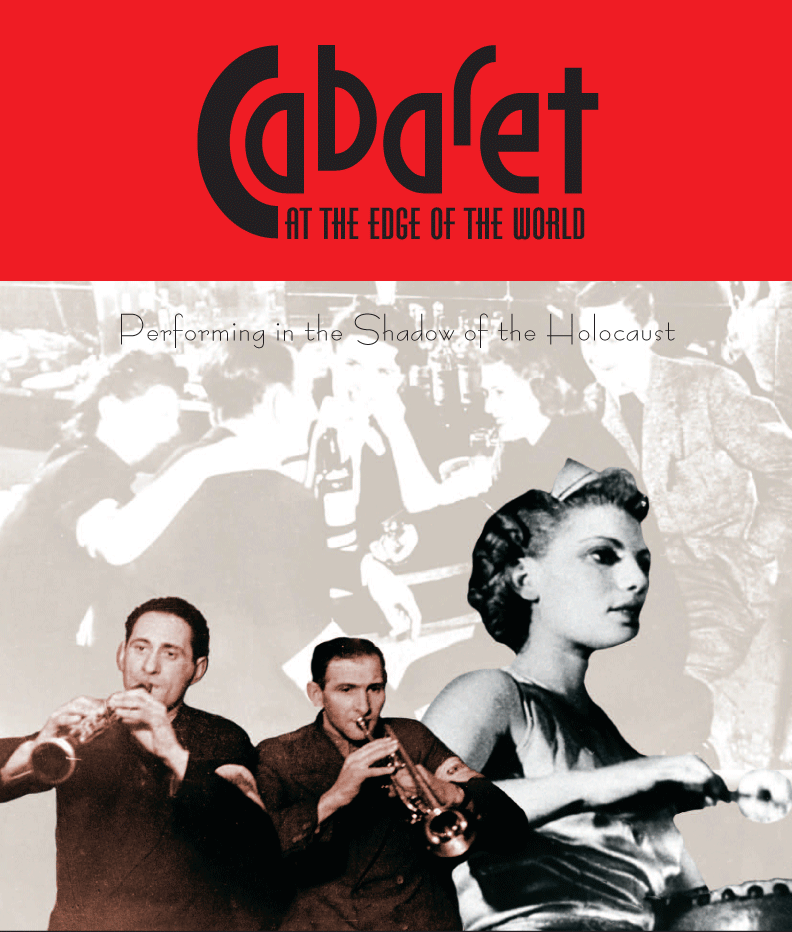 |
A Cabaret in the Warsaw GhettoProduced with Hankus Netsky. Hillel Foundation at Tufts University, 1993. Expanded and reissued by Hillel: The Foundation for Jewish Campus Life, 2005Read the article about Cabaret in The Boston Globe. |

|
Abayudaya: The Jews of Uganda.CD to accompany the book, Abayudaya: The Jews of Uganda. Abbeville Press, 2002Only available with purchase of book. BUY BOOK WITH CD |
 |
The Lord's Song in a Strange LandCD to accompany the book The Lord's Song in a Strange Land: Music and Identity in Contemporary Jewish Worship. Oxford University Press, 2000Only available with purchase of book. BUY BOOK WITH CD |
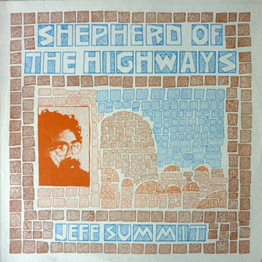 |
Shepherd of the HighwaysLyrics and music by Jeffrey A. Summit. Recorded as LP. Mount Moriah Music, 1976Available by special order. Contact Jeffrey A. Summit. |